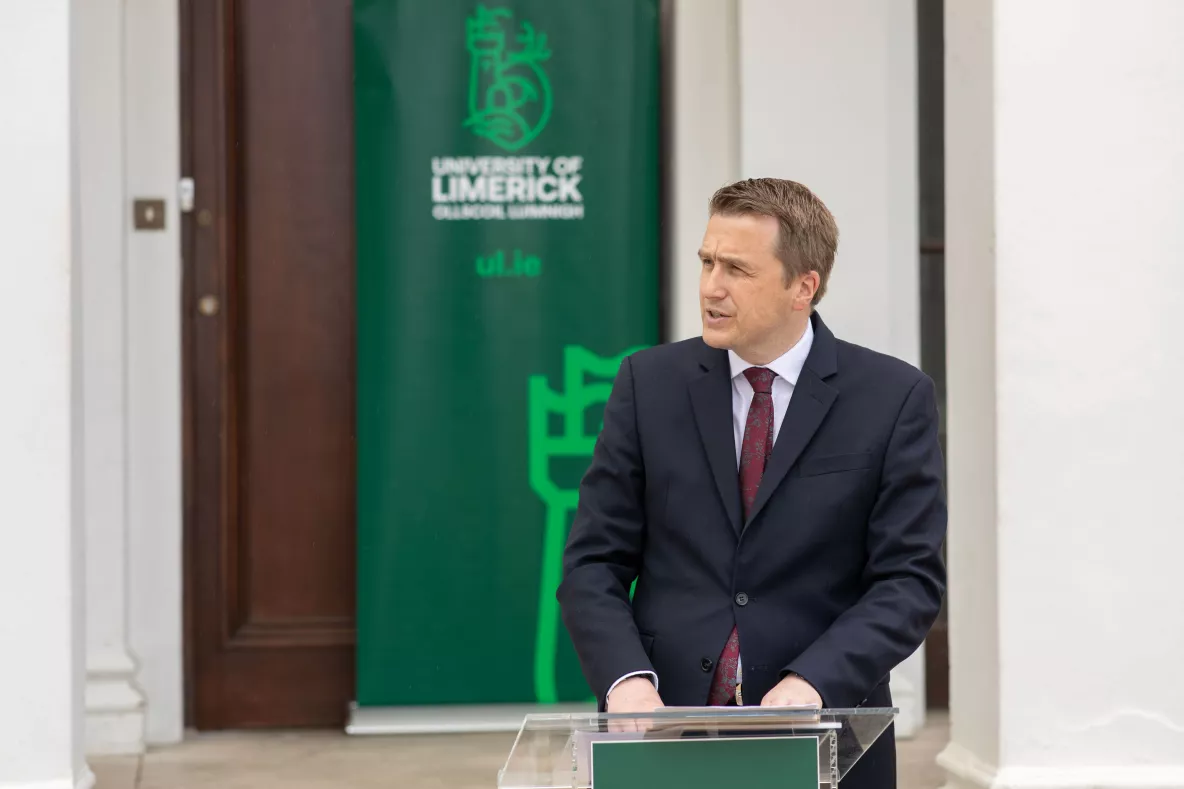
A host of international experts have gathered at University of Limerick to share best practice in tackling illegal crime networks.
Minister of State at the Department of Justice with Responsibility for Law Reform James Browne TD opened the Illicit Networks Workshop at UL this Thursday.
The event brings together more than 40 of the world leading experts from at least nine different jurisdictions. Experts invited to the conference specialise in understanding the activities of groups and organisations engaged in organised, economic, cyber, environmental and transnational crime, terrorism, gangs, corruption and human trafficking.
An intense programme of 41 presentations and workshops will take place over two days. Three keynote presentations will address online extremist and terrorist networks, criminal careers in organised crime and gang networks.
Workshops will explore the illegal transport of environmental waste to the global south, the use of social media to examine illicit networks and how to disrupt the recruitment and retention of young people in crime networks.
The important international conference was brought to Limerick by the Research Evidence into Policy, Programmes and Practice (REPPP) project, a collaboration between the UL School of Law at and the Department of Justice aimed at improving the evidence base for youth crime policymaking.
Speaking about the conference Minister Browne said: “Increasingly criminal activity requires collaboration and cooperation between individuals and groups. Better understanding about what makes these networks tick and how they sustain themselves over time can help in disrupting their activities and reducing the hold that they can have over vulnerable communities, families and young people.
“I am delighted that the University of Limerick has been successful in attracting this prestigious and important international conference. My Department continues to support the REPPP team’s work in supporting efforts to tackle crime networks. Our work can only benefit from the exchange of ideas that a conference of this type will provide.”
The REPPP programme is collaborating with the Department of Justice to improve effectiveness in reducing youth crime. REPPP has developed an international reputation for its innovative Greentown Project, which aims to disrupt and reduce the influence of criminal networks on young people.
Dr Sean Redmond, UL School of Law Adjunct Professor in Youth Justice and lead on the REPPP project, said: “This is very exciting for University of Limerick. This is the first time that this conference has been hosted in Ireland. Bringing the top researchers from around the world together in Limerick offers us the opportunity to share the best international practice in disrupting illegal networks.
“Our own Greentown project designed in Ireland to reduce the effects of crime networks on children in some communities is part of this international effort to understand how networks operate and to intervene to reduce their influence more effectively.”
The Illicit Networks Workshop will feature keynote speakers:
- Professor Dr Edward Kleemans, Vice-Dean and Director of Research of the Faculty of Law and Full Professor at the VU School of Criminology, Faculty of Law, Vrije Universiteit Amsterdam, the Netherlands (Serious and Organized Crime and Criminal Justice), whose research focuses on organised crime, including cybercrime, drug trafficking, human smuggling, human trafficking, fraud and money laundering, social organization, embeddedness, and the interaction between offenders and the criminal justice system (including policing issues);
- Dr David C. Pyrooz, Associate Professor of Sociology and Faculty Associate of Problem Behavior and Positive Youth Development at the Institute of Behavioral Science at the University of Colorado Boulder, whose research interests are in the areas gangs and criminal networks, incarceration and reentry, developmental and life-course criminology, and criminal justice policy and practice;
- Maura Conway is Paddy Moriarty Professor of Government and International Studies in the School of Law and Government at Dublin City University (DCU); professor of Cyber Threats in CYTREC at Swansea University, UK; and Coordinator of VOX-Pol, a EU-funded project on violent online political extremism (voxpol.eu). Prof. Conway’s principal research interests are in the area of terrorism and the Internet, including cyberterrorism, the functioning and effectiveness of extremist and terrorist online content, and online radicalisation. She is a member of the Academic Advisory Board of Europol’s Counter-terrorism Centre
The conference is sponsored by the Department of Justice and the Centre Internationel de Criminologie Comparée University of Montreal.
For more, see https://illicitnetworksworkshop.com/program or https://ulsites.ul.ie/law/reppp.